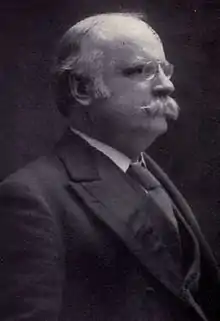Charles Doherty
Charles Joseph Doherty, PC, KC (May 11, 1855 – July 28, 1931) was a Canadian politician, lawyer, and judge from Quebec. He served as Minister of Justice from 1911 to 1921 and was one of Canada's representatives at the Paris Peace Conference.
Charles Joseph Doherty | |
|---|---|
 The Rt Hon. Charles Joseph Doherty | |
| Minister of Justice Attorney General of Canada | |
| In office October 10, 1911 – September 20, 1921 | |
| Prime Minister | Robert Borden Arthur Meighen |
| Preceded by | Allen Bristol Aylesworth |
| Succeeded by | R. B. Bennett |
| Personal details | |
| Born | May 11, 1855 Montreal, Province of Canada |
| Died | July 28, 1931 (aged 76) |
| Political party | Conservative |
| Other political affiliations | Unionist |
Early life and education
Doherty was born in Montreal, Canada East, the son of Marcus Doherty, an Irish-born judge of the Supreme Court for the Province of Quebec[1] and Elizabeth (O'Halloran) Doherty. He attended St. Mary's (Jesuit) College and received a Bachelor of Laws degree from McGill University in 1876 winning the Elizabeth Torrance Gold Medal for highest academic achievement.[1]
Career
Doherty was admitted to the bar in 1877. He was a candidate for the Legislative Assembly of Quebec for the electoral district of Montreal West in the 1881 election, but was defeated. In 1885 he served as a lieutenant with the 65th Battalion, Mount Royal Rifles in the North-West Rebellion. He ran for office again for Montreal Centre in the 1886 election.
Doherty was created a Queen's Counsel in 1887.[2] He worked as a lawyer and also taught civil and International law at McGill University prior to being appointed a judge on the Quebec Superior Court from 1891 until 1906.[2] During this time he served as the president of the main Irish fraternal organization in Montreal, St. Patrick's Society in 1902 and 1903. In 1909 he became a professor of international and civil law at McGill University.[3]
He was elected as the Conservative candidate to the House of Commons of Canada for the electoral district of St. Anne in the 1908 federal election.[2] When the Tories won the 1911 election, the new Prime Minister, Sir Robert Borden, brought Doherty into the Canadian Cabinet as Minister of Justice.[4][5]
Doherty played a role in the creation of the Canadian Bar Association in 1912 and served as its president in 1914.
At the end of World War I, Doherty was one of the Canadian delegates to the Paris Peace Conference, and served as Canadian delegate to the League of Nations from 1920 to 1922. He was appointed to the Imperial Privy Council in the 1920 New Year Honours for his service at Versailles,[6] allowing him to use the title of "The Right Honourable".
Doherty remained Minister of Justice in the government of Arthur Meighen until its defeat in 1921.[7]
Archives
There is a Charles Joseph Doherty fonds at Library and Archives Canada.[8]
See also
References
- Mark G. McGowan (29 May 2017). Imperial Irish: Canada's Irish Catholics Fight the Great War, 1914-1918. MQUP. p. 223. ISBN 978-0-7735-5079-7.
- Hector Willough Charlesworth (1919). A cyclopædia of Canadian biography. Hunter-Rose – via Internet Archive.
- "Doherty, Charles", The Catholic Encyclopedia and Its Makers, New York, the Encyclopedia Press, 1917, p. 44
 This article incorporates text from this source, which is in the public domain.
This article incorporates text from this source, which is in the public domain. - David A. Wilson (1 November 2009). Irish Nationalism in Canada. McGill-Queen's Press - MQUP. p. 171. ISBN 978-0-7735-7639-1.
- David MacKenzie; Patrice Dutil (7 July 2011). Canada 1911: The Decisive Election that Shaped the Country. Dundurn. p. 294. ISBN 978-1-4597-0011-6.
- "No. 31712". The London Gazette (Supplement). 30 December 1919. p. 1.
- Martin L. Friedland (1988). The Case of Valentine Shortis: A True Story of Crime and Politics in Canada. University of Toronto Press. p. 228. ISBN 978-0-8020-6728-9.
- "Charles Joseph Doherty fonds, Library and Archives Canada".